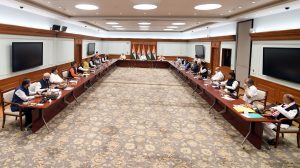India’s prime minister is holding a crucial meeting with pro-India politicians from disputed Kashmir on Thursday for the first time since New Delhi stripped the region’s semi-autonomy and jailed many of them in a crackdown.
Experts say the meeting is meant to ward off mounting criticism at home and abroad after Prime Minister Narendra Modi’s Hindu nationalist government in August 2019 downgraded the region’s status, split it into two federal territories — Ladakh and Jammu-Kashmir — and removed inherited protections on land and jobs for the local population.
Since then, Indian authorities have imposed a slew of administrative changes through new laws, often drafted by bureaucrats, that triggered resentment and anger as many likened the moves to the beginning of settler colonialism. Modi has called the changes overdue and necessary to foster economic development and fully integrate Kashmir with India.
Muslim-majority Kashmir is divided between India and Pakistan, which both claim it in its entirety. Rebels have been fighting against Indian rule since 1989. Most Muslim Kashmiris support the rebel goal that the territory be united either under Pakistani rule or as an independent country.
Modi chaired the meeting in New Delhi attended by 14 political leaders from the Himalayan region, including Modi’s own party members. India’s powerful home minister, Amit Shah, and New Delhi’s administrator in the region, Manoj Sinha, also attended the meeting.
Among those invited were Kashmir’s former three top elected officials: Farooq Abdullah, his son Omar Abdullah, and Mehbooba Mufti, who was a regional coalition partner of Modi’s Bharatiya Janata Party for nearly two years after the 2016 state elections.
Despite being pro-India and seen by many in Kashmir as New Delhi’s collaborators, Shah last year labeled them a “gang” while some others called them “anti-national elements.” Some senior ruling party leaders also dubbed them political untouchables who were rendered redundant by the 2019 decision.
The three and a few other invited leaders were among thousands arrested and held for months in 2019. They have criticized India’s policies in Kashmir and formed an alliance with four other parties to fight them, calling them “spitefully shortsighted and unconstitutional.”
Ahead of the meeting, the alliance leaders said they are demanding restoration of the region’s former special status.
The meeting follows the reaffirmation of a 2003 ceasefire accord between India and Pakistan in February as part of a peace deal brokered by the United Arab Emirates.
Sushant Singh, a senior fellow at the Center for Policy Research, a public policy think tank in India, said geopolitical reasons forced “Modi’s hand for an outreach towards Kashmiri political leaders.” In a tweet, he said Tuesday that the UAE-brokered backchannel talks led to “certain commitments from the Modi government on Kashmir.”
International pressure, particularly from U.S. President Joe Biden’s administration, has also been piling on the Indian government to reverse some of its recent changes.
Dean Thompson, acting assistant secretary of state for South and Central Asia, told a congressional hearing early this month that although New Delhi had taken some steps such as the release of prisoners and the restoration of 4G internet access in the region, “there are other electoral steps we’d like to see them take and that we have encouraged them to do and will continue to do so.”

































